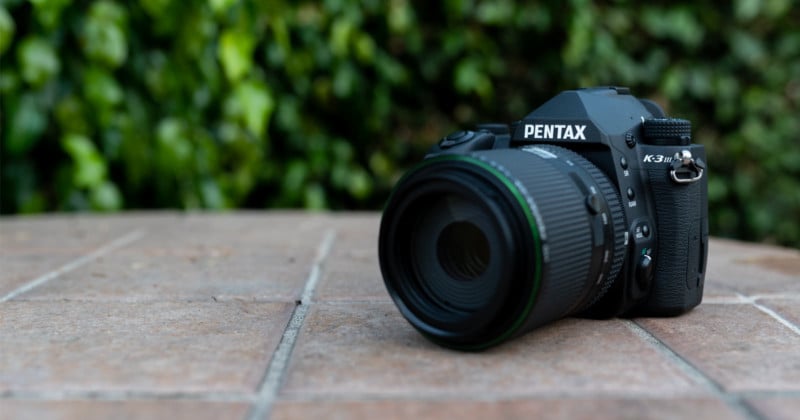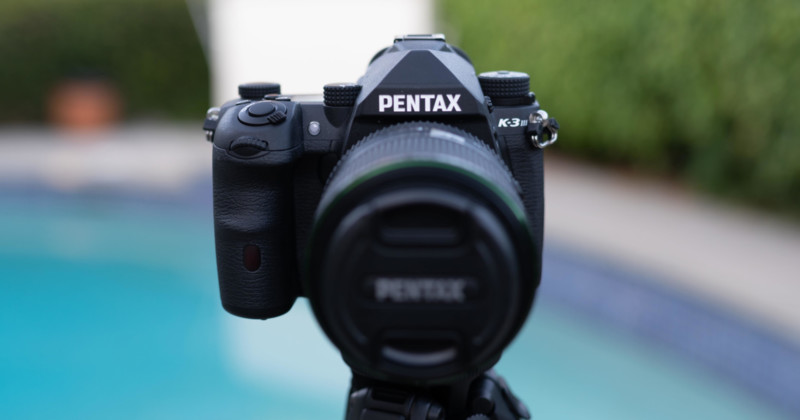Pentax May Have Lucked Out as Nikon and Canon Leave DSLRs Behind
![]()
Pentax could now be in the strange and advantageous position as the main beneficiary of the demise of the DSLR as both Canon and Nikon prepare to exit the space.
First, A Bit of History
Pentax is a household name that can trace its history back to 1919. It became a global brand, manufactured all principal camera types, and became one of the largest optical companies in the world before its sale to Ricoh in 2011.
The camera brand has a long and proud heritage in the camera industry, with a lineage of optics manufacture from the very beginning (for spectacles) through to its eventual purchase by Hoya. It manufactured military optics during World War 2, was disbanded, then reformed in 1948 when it continued with lens manufacturing, principally for (what became) Konica and Minolta.
With the increased popularity of the roll-film 35mm camera in the form of the Leica 1, the inter-war years were spent trying to solve the viewfinder problem. Leica went rangefinder, while the likes of Rollieflex pursued the twin lens reflex. The single lens reflex (SLR) arrived in 1936 and it was the post-war years that saw a flurry of development.
Pentax introduced the first Japanese SLR and then the first SLR with an instant return mirror. Its technical achievements are many, including the Spotmatic (TTL metering), producing one million SLRs by 1966, TTL auto-exposure, and TTL auto-focus amongst a number of firsts. However, it is Pentax’s breadth that is impressive, including its medium format range (the 120 6×7 cameras), as well as the popular 110 Auto.
While Pentax had been successful in film, it was slow in releasing a digital camera with the *istD not arriving until 2003, well after Nikon and Canon.
It formed a strategic partnership with Samsung during what was arguably its most fertile digital period. In fact, it was the well-priced and innovative APS-C models that garnered attention, alongside its medium format 645D. The latter arrived to critical acclaim both for its quality and modest pricing. The dual APS-C/medium format strategy preceded Fujifilm by some six years and offered photographers a genuine choice.

Pentax was also quick with its mirrorless release; in fact it was innovative in releasing not one, but two, mirrorless models. The minuscule Q featured a 1/2.3″ IBIS sensor, while the later K-01 (using a Marc Newson-designed body) had an APS-C IBIS sensor but with a traditional K-mount. Unfortunately, both were failures and Pentax has never revisited its mirrorless graveyard.
Hoya’s purchase of Pentax was principally for the optical part of the business and it didn’t take long for it to jettison the unwanted camera division to Ricoh. The expansion of the 2000s turned to contraction as a “no mirrorless” policy was adopted and the medium format was left to languish. The one highlight was its release of the first full-frame Pentax in the form of the K-1 in 2016, ironically probably at the same time Nikon and Canon decided to start mulling pulling out of the DSLR market. The 2021 K-3 Mark III had a number of innovations that showed Pentax was still capable of producing high-quality cameras, it’s just that there wasn’t much going on in terms of volume to the business.
What Does Pentax’s Future Hold?
With the “no denial” non-announcement of Nikon’s cessation of DSLR development this past week, Nikkei Asia (as reported by CanonRumors) also reports that Canon will stop producing DSLRs in the coming years.

This revelation about Nikon should not have come as a surprise, as it had already outlined its plan to retire its DSLR line earlier this year when it announced its medium term strategy with projected reductions in DSLR-sourced income from 30% in 2021 to just 4% in 2025.
Nikon and Canon face an interesting dilemma with the future of its camera development, but perhaps least contentious is stopping all DSLR development; it’s quite clear from shipments, that all of the money to be made in camera sales is with mirrorless. Quite simply, funding for technical development is being focused where it is likely to reap the most — and longest lasting — reward.
What is less clear is what should happen about the production of existing models as there is an inherent cost that must be offset against any sales. However as mirrorless becomes the pervasive technology, the number of DSLR sales — and more importantly their profit margins — will decrease. Nikon has already been decisive in killing off the 1 System, the disastrous KeyMission endeavor, and it looks like the DSLR is next. That said, it maintained 16 years of production of the F6 until 2020, so it is conceivable that the D6 (and the D850 or D780?) could be kept in production for some time.
However, that circles us back to the number of DSLR shipments: it was some 2.3 million in 2021, just down from 2.4 million in 2020. This figure seems likely to drop again this year, but that’s still a lot of cameras. Just as how shipments translate into sales remains to be seen and, by switching production to mirrorless, Nikon and Canon are pushing consumers in this direction. But the question remains: what is the ongoing market for the DSLR?
One stalwart of the DSLR has — of course — been Pentax. It doesn’t have a mirrorless model and, in fact, its brand vision boldly claims that “Pentax believes in the future of SLR photography.” In 2020, Ricoh Imaging’s CEO boldly stated that Pentax “cannot” go mirrorless.
The company comes third in BCN DSLR sales by dint of the fact that no one other than Nikon and Canon is selling them; even then, it only managed 5.8% in 2021 which may represent 130,000 units globally. Pentax currently only lists three DSLRs (excluding the 645Z medium format) in the form of the K-1 Mark II (2018), K-3 Mark III (2021), and K70 (2016) which means its commitment to manufacturing is limited, while at the same time publicly favoring the notion of limited edition customizations as opposed to mass-market production, perhaps similar to the way Leica sells into the market.

What’s remarkable about Nikon (and Canon’s) increasingly rapid exit from the DSLR market is that it potentially leaves Pentax as the “last man standing” in DSLR production. On face value, there would appear to be a viable — but small — market for the DSLR, much in the same way that Leica carried on manufacturing the rangefinder. Key to engaging this group is continued camera and lens development.
Pentax would seem to be perfectly placed to take advantage of the situation, given its expertise and current positioning. The question is whether it can convert existing DSLR users to the Pentax brand, perhaps at a premium, albeit not in the same league as mirrorless. Now would be the ideal moment for a “charm offensive”, and perhaps offering a road map of future development, to entice potential customers into the fold for what could be a continuing market of 0.5 million cameras a year.
The path is clear, and now that Pentax has its “Get Out of Jail” card by virtue that its competitors are quickly choosing to stop competing, what will it do next?
Image credits: Photos by David Crewe for PetaPixel.